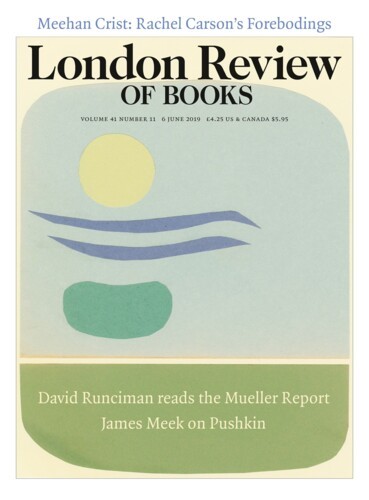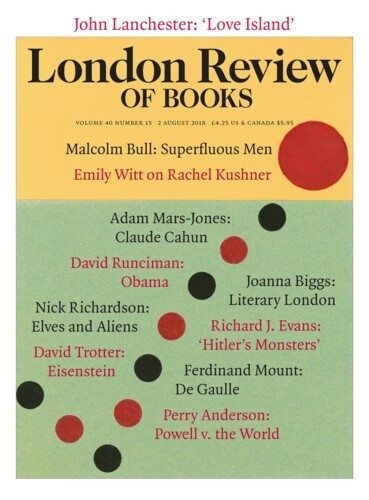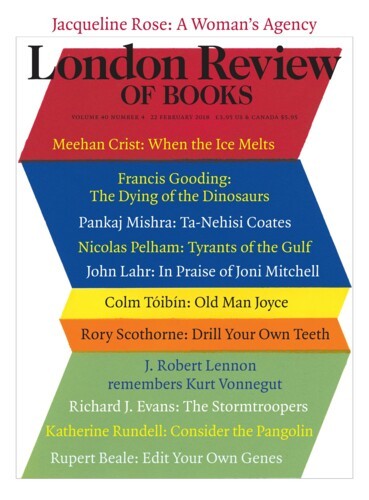Richard J. Evans
Richard J. Evans is Regius Professor Emeritus of History at Cambridge and a former president of Wolfson College. He is the author of numerous books, including The Pursuit of Power: Europe 1815-1914, Eric Hobsbawm: A Life in History and a three-volume history of the Third Reich.
The Demented Dalek: Michael Gove
Richard J. Evans, 12 September 2019
Gove, like Johnson, has never worried about inconsistency. In March, for example, he declared firmly: ‘We didn’t vote to leave without a deal. That wasn’t the message of the campaign I helped lead.’ He seems to approach every subject with the mentality of an Oxford Union debater: no matter what you’ve said before, the main thing is to trounce whoever happens to be in front of you at the time.
Whiter Washing: Nazi Journalists
Richard J. Evans, 6 June 2019
Under the Weimar Republic newspapers and magazines flourished as never before in Germany. Contrary to Volker Berghahn’s claim in Journalists between Hitler and Adenauer that the press had enjoyed ‘a good deal of tolerance’ under Bismarck and the Kaiser, the imperial German state had come down hard on the newspapers, especially those on the left; no editor of a Social...
Nuts about the Occult: ‘Hitler’s Monsters’
Richard J. Evans, 2 August 2018
A couple of years ago, a Russian television channel asked if they could interview me for a programme they were making about Hitler. I get these requests every so often, and agreed in the usual hope that I would be able to pour some cold water on whatever outlandish theories they came up with. On previous occasions I have been confronted with claims that the entire German population...
Men He Could Trust: Hitler’s Stormtroopers
Richard J. Evans, 22 February 2018
When the International Military Tribunal convened at Nuremberg shortly after the end of the Second World War, one of the many objects of its attention were the Storm Divisions (Sturm-Abteilungen, SA) of the Nazi movement. The SA, the prosecution alleged, had been a criminal organisation involved in war crimes and crimes against humanity. The ‘National Bolshevist’ Ernst Niekisch,...
Podcasts & Videos
Anthony Wilks's film traces the connections between the events of Eric Hobsbawm’s life and the history he told, from his teenage years in Germany and his communist membership, to the jazz clubs of 1950s...
From Cholera to Coronavirus
David Runciman and Richard J. Evans
David talks to the historian Richard J. Evans about the history of cholera epidemics in the 19th century and what they can teach us for today.
Pieces about Richard J. Evans in the LRB
I want to love it: What on earth was he doing?
Susan Pedersen, 18 April 2019
Was Eric Hobsbawm interested in himself? Not, I think, so very much. He had a more than healthy ego and enough self-knowledge to admit it, but all his curiosity was turned outward.
Echoes from the Far Side: The European Age
James Sheehan, 19 October 2017
Max Weber defined power as ‘the ability of an individual or group to achieve their own goals or aims when others are trying to prevent them from realising them’. The pursuit of...
Breathtaking Co-ordination: Hitler’s Wartime Economy
Jonathan Wright, 19 July 2007
Richard Evans’s history of the Third Reich – it will be completed by a third volume covering the war – is an invaluable work of synthesis. The mass of specialist studies we now...
Laid Down by Ranke: defending history
Peter Ghosh, 15 October 1998
Richard Evans hopes that this book will take the place of E.H. Carr’s What is History? and G.R. Elton’s The Practice of History as the ‘basic introduction’ to history as...
Axeman as Ballroom Dancer
David Blackbourn, 17 July 1997
In future times people will look back on the death penalty as a piece of barbarity just as we now look back on torture.’ These confident words were spoken by a member of the 1848 Frankfurt...
Germans and the German Past
J.P. Stern, 21 December 1989
The ‘white years’ of German history – the period between the end of the war and Adenauer’s first government of 1949 – were notable for two blank spaces in the...
Disease and the Marketplace
Roy Porter, 26 November 1987
In mid-August 1892, Hamburg was basking in a heatwave. Workers splashed around in the River Elbe, which reached an almost unprecedented 70°F. Then people started to go down with intestinal...
Read anywhere with the London Review of Books app, available now from the App Store for Apple devices, Google Play for Android devices and Amazon for your Kindle Fire.
Sign up to our newsletter
For highlights from the latest issue, our archive and the blog, as well as news, events and exclusive promotions.





